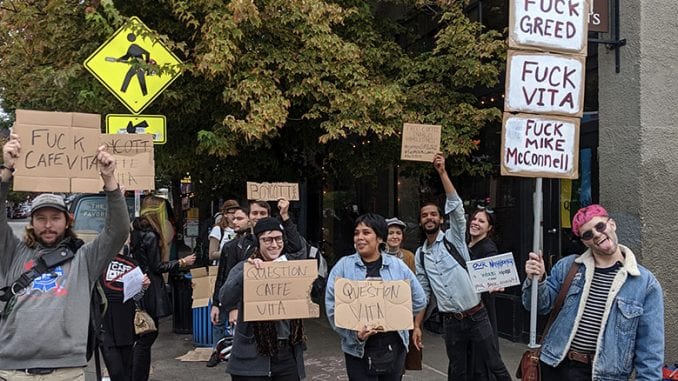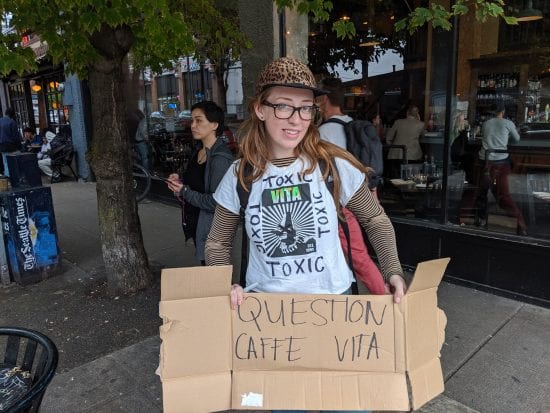
Activist group seeks accountability from an iconic Seattle roastery.
BY MARK VAN STREEFKERK
BARISTA MAGAZINE ONLINE
Cover photo by Conor Poull
Almost no Seattle café chain gets more local credit than Caffe Vita, perhaps the city’s best-known independent roaster since its inception in 1995. Marina, a former barista there, says, “I loved working at Vita. It was a cool shop. There was a lot of social clout involved with working there. It’s edgy, it’s full of punks, it was loud always. I would not have ever wanted to leave. It fit like a glove.”

Marina was one of three employees fired from the Capitol Hill café for allegedly giving free pastries and coffee to houseless patrons. Upper management at Caffe Vita fired two baristas and one café manager in the middle of an attempt to enforce a policy about day-old pastries that former employees say was never articulated. The company sent an email to all employees, stating that while Caffe Vita is involved in charitable organizations … “it is our belief, that feeding homeless people without comprehensive services actually enables, increases, and promotes homelessness … If our business is filled with homeless people, many of our customers will likely choose alternatives, negatively impacting our livelihoods.”
The email also says that “giving away products is theft and the grounds for immediate employment termination.”
There was an attempt at dialogue between baristas and upper management after backlash over the email; however, a solution was not reached.
“Since opening in 1995, Caffe Vita has not had a protocol on pastry waste, nor a policy in place in the handbook to refer to for guidance,” says Hannah, another former café manager there.
Hannah worked at Vita for five and a half years before being told that “since two people from my barista team have been let go for policy violation, they were going to be making changes within management, and that they would have to let me go.”
Hannah was fired on September 23, a day after Marina. The terminations were sudden and without warning—and included a person of color and a trans woman—prompting at least seven more employees to leave in solidarity. The fallout quickly coalesced into Coffee Riot Seattle. The group established an Instagram profile @coffeeriotseattle and protested in front of Caffe Vita on Wednesday, October 2.

“We felt like the community had a right to know who and what they are supporting by buying Caffe Vita products,” says Travis Geoffroy-Rogers, a former Vita employee who quit in the wake of the terminations.
The protests included sign-making, chanting “Boycott Vita,” and the distribution of hundreds of flyers. The flyers called for accountability, claiming that as of September, Caffe Vita owner Mike McConnell and management have fired a quarter of Capitol Hill baristas. Protesters posted at four corners of the block, handing out flyers and talking to passersby. “We had a lot of support,” Marina says. “People stopped to talk to everyone, ‘Hey, what’s up? What’s going on?’ People wanted to talk to us because Vita’s part of the community, and for us to say, ‘There are more cracks in this pillar than you realize,’ I think that people heard it, people respected it, and people wanted to see a change.”
Laura Friedman, another barista who quit in solidarity, said they’d want to “see upper management work WITH baristas and store managers to SUPPORT them, not undercut their efforts. Maybe they could even ask us questions about what they think the store needs given that we were the ones selling the coffee every single day. I’d also like to see internal policy written that reflects education within the organization about the houselessness crisis in Seattle.”
The mission statement of Coffee Riot Seattle says: “We are a collective of industry workers. We represent a wide range of identities and lived experiences. We are working together to expose harmful internal and external business practices, with the purpose of holding business owners accountable. We hope to inform community members about the businesses they are investing in by amplifying the experiences of minimum wage workers in Seattle. We do this work not only to improve our own working conditions, but to build community and solidarity in a city undergoing massive expansion that affects us all.”
Local news outlets from across the city covered the protests. “Even a community organizer reaching out on behalf of (Seattle City Councilwoman) Kshama Sawant expressed support and asked how they can support me and the other café workers,” Hannah says.
At the time of this article, Caffe Vita has not communicated with Coffee Riot Seattle.
“(We) want to keep spreading awareness about the actions and policies of Caffe Vita. That can take a variety of forms, but the (first) of those forms will be art-focused, such as posters and visual art being done throughout Seattle. We want to spread awareness while also directly involving the community that was impacted,” says Travis.
Caffe Vita was contacted by Barista Magazine for this article, but did not respond to requests for comment.

ABOUT THE AUTHOR
Mark Van Streefkerk is Barista Magazine’s social media content developer and a frequent contributor. He is also a freelance writer, social media manager, and novelist based out of Seattle. If Mark isn’t writing, he’s probably biking to his favorite vegan restaurant. Find out more on his website.

